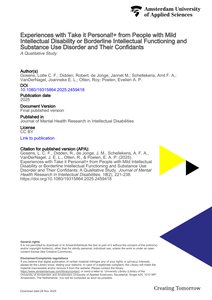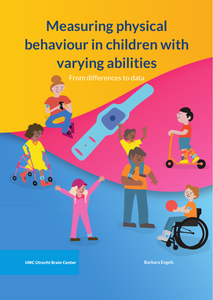Background. Children with developmental coordination disorder (DCD) face evident motor difficulties in daily functioning. Little is known, however, about their difficulties in specific activities of daily living (ADL). Objective. To (a) investigate differences between children with DCD and their typically developing peers, for ADL performance, learning, and participation, and (b) explore the predictive values of these aspects. Design. Cross-sectional study.Methods: Both in a clinical sample of children diagnosed with DCD (n=25, age range 5-8 years; 21 males) and typically developing peers (25 matched controls), parents completed the DCDDaily-Q. Differences in scores between the groups were investigated using T-tests for performance and participation, and Pearson’s Chi-square for learning. Multiple regression analyses were performed to explore the predictive values of performance, learning, and participation. Results. Compared to peers, children with DCD showed poor performance of ADL (p≤.005 for all items), delays in learning of ADL p≤.002 for all items), and less frequent participation in some ADL (p=.001 for mean total scores, p≤.05 for 7 out of 23 items). Children with DCD demonstrated heterogeneous patterns of performance (poor in 10-80% of the items) and learning (delayed in 0-100% of the items). In the DCD group, delays in learning of ADL were a predictor for poor performance of ADL (p=.001), and poor performance of ADL was a predictor for less frequent participation in ADL compared to peers (p=.040). Limitations. A limited number of children with DCD was addressed in this study.Conclusions. This study highlights the impact of DCD on children’s daily lives and the need for tailored intervention.
DOCUMENT
AimTo investigate: (a) language difficulties in children with developmental coordination disorder (DCD), and (b) motor difficulties in children with developmental language disorder (DLD).MethodIn this systematic review, PubMed, CINAHL, PsycINFO, and Embase were searched to identify peer-reviewed studies. Two researchers independently identified, screened and evaluated the methodological quality of the included studies following the Preferred Reporting Items for Systematic reviews and Meta-Analyses (PRISMA). For objective (a), we combined the terms: “developmental coordination disorder” AND “language skills” AND “children”. For objective (b) we combined the terms: “developmental language disorder” AND “motor skills” AND “children”.ResultsTen studies on language skills in children with DCD and 34 studies on motor skills in children with DLD are included, most with relatively good methodological quality. The results for language comprehension and production in children with DCD are contradictory, but there is evidence that children with DCD have communication and phonological problems. Evidence for general motor problems in children with DLD is consistent. Studies report problems in balance, locomotor, and fine motor skills in children with DLD. Evidence for aiming and catching skills is inconsistent.InterpretationThe findings of this systematic review highlight the co-occurrence of language impairments in children with DCD and motor impairments in children with DLD. Healthcare professionals involved in the assessment and diagnosis of children with DCD or DLD should be attentive to this co-occurrence. In doing so, children with DCD and DLD can receive optimal interventions to minimize problems in their daily life.
DOCUMENT
Sport en bewegen is van belang voor de ontwikkeling van kinderen. Dat geldt ook voor kinderen met Development Coordination Disorder, oftewel kinderen die problemen ervaren bij het uitvoeren van motorische vaardigheden zoals voetballen, fietsen, rennen en klimmen. De komst van digitale middelen in het onderwijs, biedt nieuwe mogelijkheden voor ondersteuning voor deze groep, die een stuk minder beweegt. In dit artikel introduceren we de aanpak ‘Zelfstandig sporten van kinderen met DCD’.
LINK
Introduction: Although some adults with autism spectrum disorder (ASD) require intensive and specialized ASD treatment, there is little research on how these adults experience the recovery process. Recovery is defined as the significant improvement in general functioning compared to the situation prior to treatment. Methods: This qualitative study describes the recovery process from the perspective of adults on the autism spectrum during intensive inpatient treatment. Semi-structured interviews (n = 15) were carried out and analyzed according to the principles of grounded theory. Results: Our results indicate that, given the specific characteristics of autism, therapeutic interventions and goal-oriented work cannot be carried out successfully, and the recovery process cannot begin, if no good working relationship has been established, and if care is not organized in ways that a person on the autism spectrum finds clear and predictable.
DOCUMENT

The aim of this study was to examine differences in the performance of children with probable Developmental Coordination Disorder (p-DCD) and balance problems (BP) and typical developing children (TD) on a Wii Fit task and to measure the effect on balance skills after a Wii Fit intervention. Twenty-eight children with BP and 20 TD-children participated in the study. Motor performance was assessed with the Movement Assessment Battery for Children (MABC2), three subtests of the Bruininks Oseretsky Test (BOT2): Bilateral Coordination, Balance and Running Speed & Agility, and a Wii Fit ski slalom test. The TD children and half of the children in the BP group were tested before and after a 6 weeks non-intervention period. All children with BP received 6 weeks of Wii Fit intervention (with games other than the ski game) and were tested before and afterwards. Children with BP were less proficient than TD children in playing the Wii Fit ski slalom game. Training with the Wii Fit improved their motor performance. The improvement was significantly larger after intervention than after a period of non-intervention. Therefore the change cannot solely be attributed to spontaneous development or test-retest effect. Nearly all children enjoyed participation during the 6 weeks of intervention. Our study shows that Wii Fit intervention is effective and is potentially a method to support treatment of (dynamic) balance control problems in children.
LINK
IntroductionTake it Personal!+ is a treatment program for individuals with Mild Intellectual Disability or Borderline Intellectual Functioning (MID-BIF) and Substance Use Disorder (SUD). It is supported by a mobile health application (mHealth), and researchers found it can reduce Substance Use (SU). Aims: This study aimed to explore the usability of the treatment program in as experienced by clients and their confidants.MethodsWe conducted post-treatment, semi-structured interviews with clients (n = 8) and their confidants (n = 8). We coded transcripts according to thematic analysis and using inductive and deductive methods. Subsequently, we analyzed connections between the codes and grouped them into themes using axial coding.ResultsOverall clients and confidants experienced the treatment program as usable, and most mentioned the program helped to reduce SU. The clients and confidants reported the presence of a confidant was helpful. Some clients and confidants reported the mHealth application was helpful. Components that were perceived as effective were self-control skills, daily registration exercise and discussing quantity of SU non-judgingly. Perceived impeding factors were video calling and a non-supportive network.ConclusionThis study shows that Take it Personal!+ is an useable treatment program for individuals with MID-BIF and SUD, that helps to decrease their self-reported SU. Nevertheless, there is room for improvement for further adapting the treatment, which will be discussed.
DOCUMENT

Purpose: This study aimed to develop and pretest a systematic conversation approach for nurses to tailor aftercare to oncology patient's goals, unmet needs and wishes. Methods: We used an iterative developmental process for complex interventions: 1. Identifying problems 2. Identifying overall objectives 3. Designing the intervention 4. Pretesting and adapting the intervention. Results: The main results of the problem identification were: non-systematic and incomplete screening of potential issues, caveats in providing information, and shared decision-making. The overall objective formulated was: To develop a model for aftercare conversations based on shared goal-setting and decision-making. The conversation approach consists of four phases: 1. Preparation of the consultation including a questionnaire, 2. Shared goal-setting by means of a tool visualizing domains of life, and 3. Shared care planning by means of an overview of possible choices in aftercare, a database with health care professionals and a cancer survivorship care plan. 4. Evaluation. The results of the pretest revealed that the conversation approach needs to be flexible and tailored to the patient and practice setting, and embedded in the care processes. The conversation approach was perceived as enhancing patient-centeredness and leading to more in-depth consultations. Conclusion: The conversation approach was developed in co-creation with stakeholders. The results of the pretest revealed important implications and suggestions for implementation in routine care. The aftercare conversation approach can be used by nurses to provide tailored patient-centered evidence-based aftercare. Tailored aftercare should support oncology patient's goals, unmet needs and wishes. Further tailoring is needed.
DOCUMENT

This thesis aims to develop and validate a comprehensive and adaptable activity monitoring system that quantifies physical behaviours in children with and without developmental disabilities, including those utilizing assistive devices. This system seeks to overcome the current limitations in the accuracy and feasibility of existing monitoring devices by providing robust measurements in real-world settings.
MULTIFILE

Parental involvement is a crucial force in children’s development, learning and success at school and in life [1]. Participation, defined by the World Health Organization as ‘a person’s involvement in life situations’ [2] for children means involvement in everyday activities, such as recreational, leisure, school and household activities [3]. Several authors use the term social participation emphasising the importance of engagement in social situations [4, 5]. Children’s participation in daily life is vital for healthy development, social and physical competencies, social-emotional well-being, sense of meaning and purpose in life [6]. Through participation in different social contexts, children gather the knowledge and skills needed to interact, play, work, and live with other people [4, 7, 8]. Unfortunately, research shows that children with a physical disability are at risk of lower participation in everyday activities [9]; they participate less frequently in almost all activities compared with children without physical disabilities [10, 11], have fewer friends and often feel socially isolated [12-14]. Parents, in particular, positively influence the participation of their children with a physical disability at school, at home and in the community [15]. They undertake many actions to improve their child’s participation in daily life [15, 16]. However, little information is available about what parents of children with a physical disability do to enable their child’s participation, what they come across and what kind of needs they have. The overall aim of this thesis was to investigate parents’ actions, challenges, and needs while enhancing the participation of their school-aged child with a physical disability. In order to achieve this aim, two steps have been made. In the first step, the literature has been examined to explore the topic of this thesis (actions, challenges and needs) and to clarify definitions for the concepts of participation and social participation. Second, for the purposes of giving breadth and depth of understanding of the topic of this thesis a mixed methods approach using three different empirical research methods [17-19], was applied to gather information from parents regarding their actions, challenges and needs.
DOCUMENT

Under the premise that language learning is bidirectional in nature, this study aimed to investigate syntactic coordination within teacher-student interactions by using cross-recurrence quantification analysis (CRQA). Seven teachers’ and a group of their students’ interactions were repeatedly measured in the course of an intervention in early science education. Results showed changes in the proportion of recurrent points; in case of simple sentences teachers and students became less coordinated over time, whereas in case of complex sentences teachers and students showed increasing coordination. Results also revealed less rigid (more flexible) syntactic coordination, although there were no changes in the relative contribution of teacher and students to this. In the light of the intervention under investigation this is an important result. This means that teachers and students learn to use more complex language and coordinate their language complexity better in order to co-construct science discourse. The application of CRQA provides new insights and contributes to better understanding of the dynamics of syntactic coordination.
DOCUMENT
